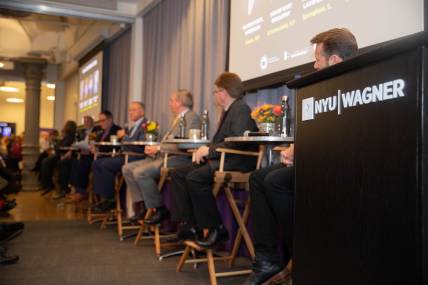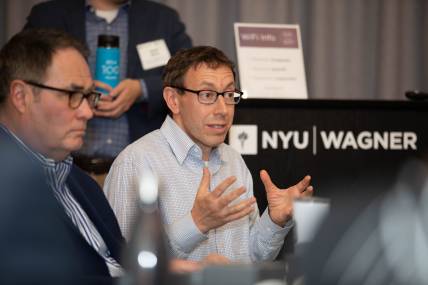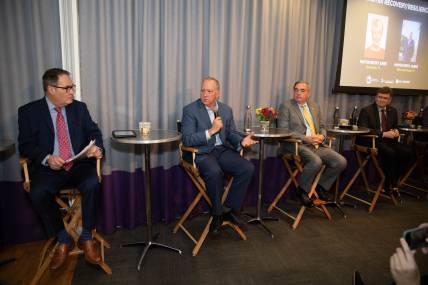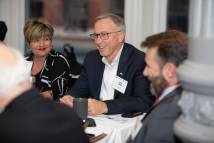Mayors Say They're at Forefront of Government Responsiveness
Situated at the front lines of government, mayors of small and mid-sized cities increasingly find themselves dealing directly with the impact of climate change, immigration, and technological and economic shifts – with little or no help, several of them say, from Washington.
“If you look to the federal government to solve your problems, you’ll go blind,” remarked the Hon. Daniel Horrigan of Akron, OH, one of seven mayors speaking at NYU Wagner at a forum Nov. 14 on the challenges of public service in America’s urban areas.
The Second Annual Urban Transformation Forum: Mayors Changing Cities unfolded before more than 200 public service students, scholars, and practitioners, and was sponsored by NYU Wagner, the U.S. Conference of Mayors (USCM), and the David Bohnett Foundation.

These and other mayors were gathered at the school for a meeting of the Smart Cities Institute, a collaborative effort of NYU Wagner and the USCM that helps city leaders harness technologies and make their municipalities run smarter. Gordon J. Campbell, Clinical Professor of Public Service and Director of the EMPA-Public Service Leaders Program, moderated the discussion and audience Q&A. USCM’s CEO and Executive Director Tom Cochrane and the philanthropist and technology entrepreneur David Bohnett offered framing remarks at the outset.
The mayors on hand said that city government is the first, and sometimes only, resort for their constituencies because the politically polarized federal government is often stuck in neutral. At the local level, they said, they have no room for divisive political rhetoric in their role seeking to extend help to new immigrants, economic opportunity to struggling constituents, or storm relief to flooded and maimed neighborhoods.
“I can’t send a mean tweet out to someone I’m going to meet at the grocery store,” said the Hon. Shane Bemis of Gresham, OR, reflecting on the importance of instead bringing neighbors together to work on shared concerns.

Politically charged national debates also have consequences that can fall into any mayor’s lap. Adding a citizenship question to the census, for example, could produce a population under-count in Mayor John Giles’ city of Mesa, AZ, about 100 miles from the Mexican border, and with that, he said, a significant loss of federal aid.
The critical role that mayors play registers with most people. “They’re calling City Hall, not calling the state capital, not calling the White House,” explained the Hon. Keith James of West Palm Beach, FL.
Mayor Becky Ames’ city of Beaumont, Tx, is using data to map neighborhoods according to storm-flood vulnerabilities, contributing to planning and preparations. Meanwhile, in Schenectady, NY, and in Springfield, IL, mayors Gary McCarthy and James Langfelder, respectively, are working with the local utility operator to expand Wi-Fi connectivity to lower income rural and urban sections, tying community members to one another, and to the rest of the world.
“As mayors, we’ve just got to get stuff done,” summed up Ames.

